100 Women 2014 as it happened
- Published
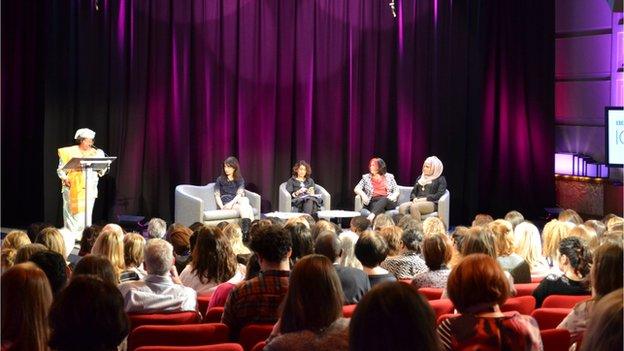
19:38: That concludes our coverage of today's 100Women reprise. Remember, you can find all of our best content in one place. Thanks for joining us.
19:00: Major Nicola Roberts tells the BBC she has been "judged on my ability as opposed to my gender", external.
18:20: The World Service is joined by women who have served on the frontline to discuss their lives and what it is like succeeding as a woman in what is traditionally seen as a man's world.
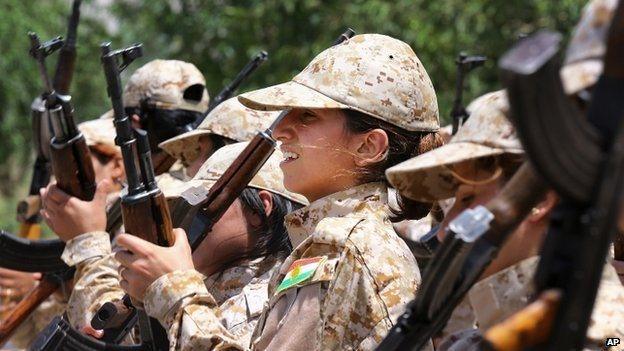
We are speaking to women from USA, UK, Israel, Kenya, Pakistan and Australia - including a former bomb disposal expert, the first woman to kill a member of the Taliban and a woman who was the highest ranking female officer in the British armed forces.
Do you have a question for our guests about life as a woman in the military? Get involved using the hashtag #100Women.
17:30: There were a lot more comments on BBC Persian's Your Turn interactive debate earlier. Here's a flavour of a few more of them below (we told you it was lively):
Ali from Malaysia: "I make an effort with my cooking, and because of that, I get laughed at for being like a woman."
Mohammad from Tehran: "Women are not created to do the tough jobs, and that's why people laugh at them when they do."
Kouhyar: "There's a Persian saying: I give you my word as a man. But my mother used to say: I give you my word as a woman, It was her way of challenging all the stereotypes."
Nasrin from Germany: "The brain of a human is not located in the muscles; so women don't need to be muscular like men, in order to be wise."
17:00: You can now watch Shappi Khorsandi speaking about the challenges facing her daughter.
Comedian Shappi Khorsandi: "I want my daughter to be able to sideswipe these comments which patronise and demean us with dignity and compassion and that's not always easy"
16:45: Nigerian girl Shakarat says: "I told my mother I wanted to become president of Nigeria, and she laughed. She said you can't become president of Nigeria it's not possible because I am a girl." She's been talking to the BBC's World Service. You can now listen to the full report, external.
16:38: There's been some heated debate today about everyday sexism on BBC Persian's Your Turn interactive programme. Here's a selection of some of the views expressed:
Sarvin, from Tehran: "If a woman talks to a man about something like parking the car or a business issue, he often says: 'I don't want to argue with you, because you're a woman'."
Shahnaz, from Tehran: "Things have changed and got much better now. Nowadays there are a lot of men who defend women's rights and equality."
Ali, from Malaysia: "I wouldn't laugh at sexist jokes, I'd rather try to show some reaction against them."
Saghar, from Dublin: "People have even made jokes about Iran's recent acid attacks."
Kouhyar, from Turkey via webcam: "We shouldn't try to justify sexism based on cultural background."
15:51: British racing driver Alice Powell has tweeted this:
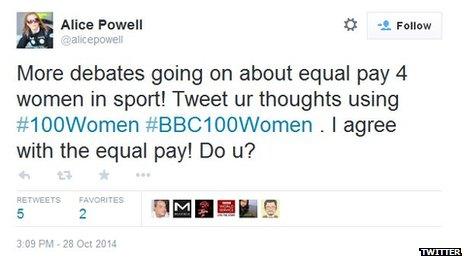
15:38: Shazia Saleem (below, right) says her brother put his exams on hold to help her with hers. She tells parents: "Don't validate the fear of the hurdle. It didn't exist for me."
.jpg)
And Prof Lesley Yellowlees (left) advises women against spreading themselves too thinly. "You need someone to tell you to stop and focus on what you really want to do," she says.
Shappi Khorsandi says her father told her: "Love what you do so much you'll do it for free."
15:35: Shazia Saleem says her brother put his exams on hold to help her with hers. In a message to parents, she said: "Don't validate the fear of the hurdle. It didn't exist for me."
.jpg)
15:26: Strong comments from Joyce Banda, former president of Malawi, in a Q&A: "I don't want anyone to say women are their own enemies. We need to stand by each other and vote for one another. We must accept it."
15:17: In an emotional address, comedian Shappi Khorsandi says: "I was daunted at the prospect of having a girl and going through their teenage years."
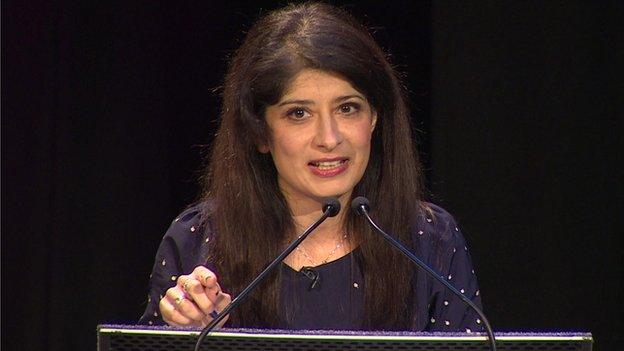
"I want her to be able to sideswipe sexist comments. I want her to have wider career choices." Not every girl gets to be a princess, she adds.
15:15: You can now watch part of former Malawian president Joyce Banda's speech.
Former Malawi president Joyce Banda: "It would be tragic for this world to ignore this enormous human resource called women"
15:04: One of our 100 Women has tweeted this:
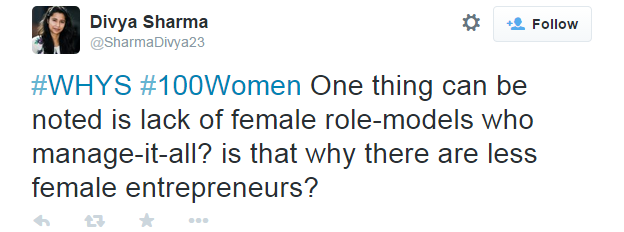
14:59: Prof Lesley Yellowlees, the first female president of the Royal Chemistry Society, has some figures for us. She says only 8% of professors and engineering chemistry are female, compared to 16% in biology.
"To have so many graduates leave these disciplines is a waste. There is no such thing as a girl job or a boy job - there is just a job," she adds.
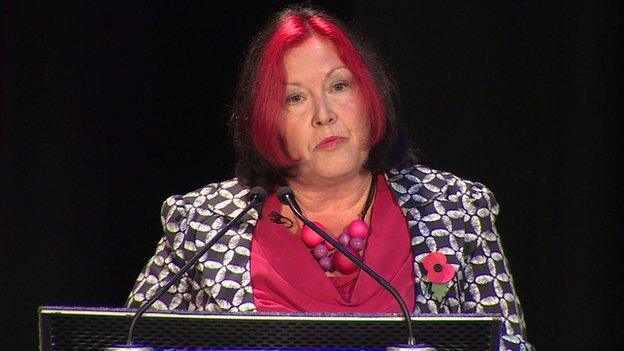
"My own experiences have been "hugely positive". I have enjoyed the rigour of research and the exhilaration of academic study - it is possible to have a career in science and have a family," she says.
14:50: The BBC Languages Social Media Editor on the response online to the 100Women series.

14:46: "I used my position to highlight the lack of women in science and engineering," says Prof Yellowlees.
14:40: Comedian Kate Smurthwaite says women's image is "utterly irrelevant" to their performance at work.
14:33: Rousing stuff from Shazia Saleem, founder of ieat Foods. She recalls men who did not acknowledge her at the start of meetings and asked her to make the tea, but then reacted "with horror" when she conducted the meeting.
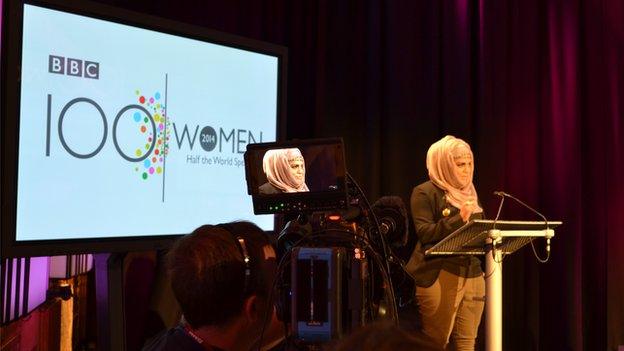
"I know so many girls who think their only role in life is to make tea," she says.
"Be the person that a younger girl looks up to and says I can do this because she's done it."
14:29: The Daily Telegraph tweets from former president of Malawi Joyce Banda's opening remarks about her time in office a few moments ago.
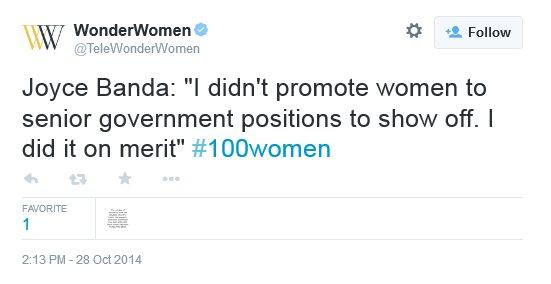
14:22: During a Q&A session, Joyce Banda also says she found resistance from "pockets of society" when she started her senior post. She also says women need to support each other more.
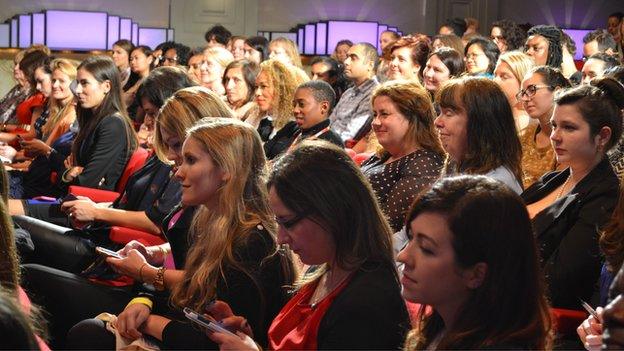
14:05: Our keynote speaker, former Malawi president Joyce Banda, kicks off the event. She says women have made important strides in public life across the world. "Africa has done very well," she adds.
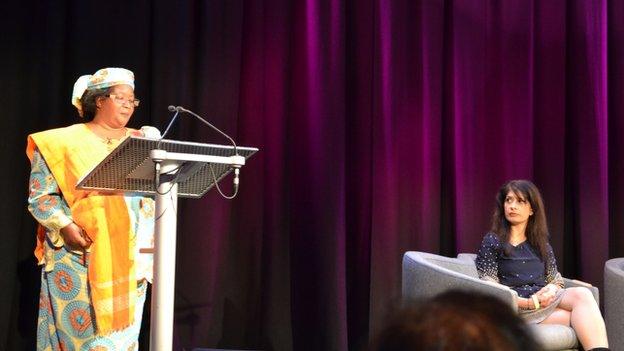
Ms Banda says women are able to compete in politics "comfortably" and help other women, too. "Women leaders bring human faces to policy," she adds.
"It would be tragic for this world to ignore this enormous human resource called women," she warns.
13:50: Some of our women are arriving here at the BBC in London for our event, which will be streamed live on this page from 14:00.
13:03: BBC Sport's discovery that 30% of sports reward men more highly than women makes for depressingly familiar reading.
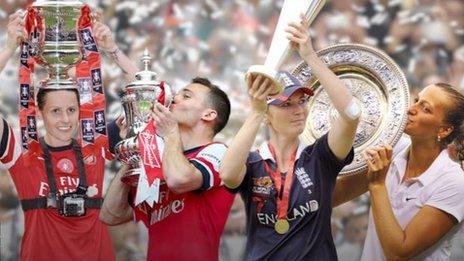
12:51: Some fantastic support on Twitter for Rupa's piece on the taboo about menstruation in India.

12:48: See where in the world gender equality is at its best and worst in the world with our map.
12.30: Syrian refugee Oum Ali has been appearing on BBC World News. The mother-of-six opened up a kitchen in Lebanon employing other woman who have fled their home country.
Syrian refugee Oum Ali has opened up a kitchen in Lebanon employing other woman who have fled their home country
12.22: The news that the gender gap is narrowing has generated some heated discussion online.


11:47: "Girls should not stop themselves from achieving their dreams because they are female." Two teenage BBC School Reporters show wisdom beyond their years.
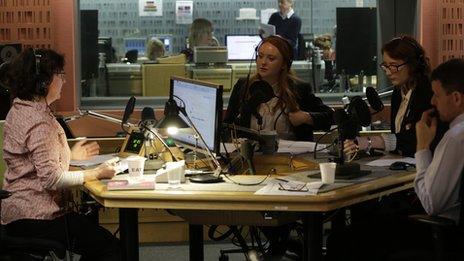
Last year's School Report girls spoke to Woman's Hour
10:58: One of the BBC's 100 Women Laura Bates, founder of Everyday Sexism, external, says she has collected 80,000 testimonies from women about "extreme" sexism in schools to domestic violence and rape since she started the project.
Echoing Harry Potter star Emma Watson's rallying call for boys to be feminists, Laura says sexism is "absolutely for everybody" as it is a human right's issue.
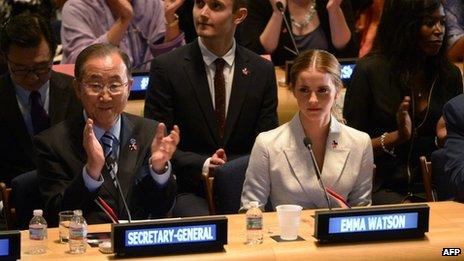
Emma Watson recently called for boys to feminists
10:54 The BBC's Shaimaa Khalil says there are "layers of problems" with education in Pakistan, as we hear from one of the country's girls who was beaten by her father after he found out she had gone to school behind his back.
10:32: People on Twitter are excited about our video of Kenya's boxing girls, if you missed it watch here
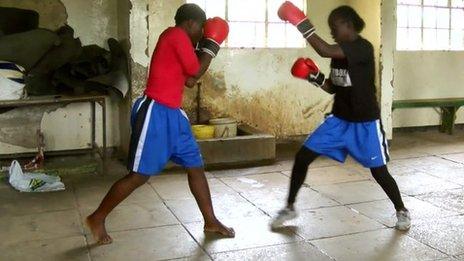
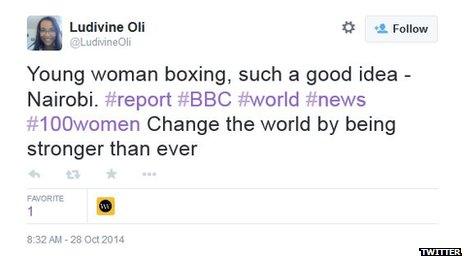
09:52: Listen to the touching moment, external when a woman discovers her niece has been released by Boko Haram as she speaks to the BBC's Nuala McGovern in Nigeria's capital Abuja.
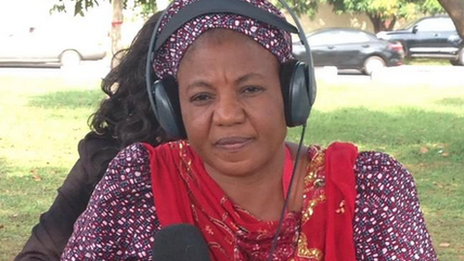
Comfort said she cried with joy when her niece was released
09:48: One 15-year-old school girl tells Nuala: "The schools in the north west don't have security, no police man. The police, soldiers, most of them are scared.
"They [the government] say they employ all these men to go there and fight but I don't believe them."
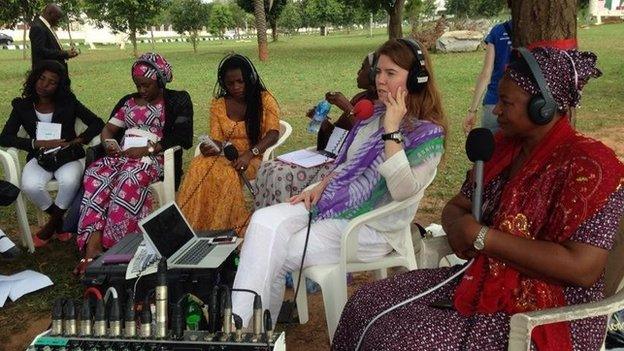
"It's better to be a boy in Nigeria" one school girl tells the BBC in Abuja
Aisha, 15, says: "It's better to be a boy because in Nigeria, the mentality of every African is that boys are better than girls."
Eye-opening stuff. She adds: "People say girls can't become president but I know different." Go Aisha! A 100 Woman in the making...
09:44: Nuala hears from the girls who escaped the Boko Haram kidnapping, which you can see in this animation as part of 100 Women season.
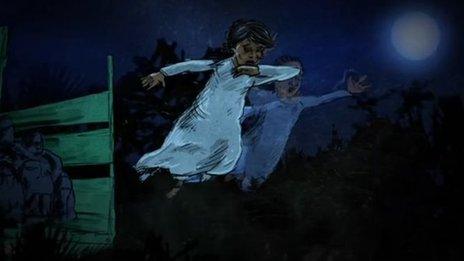
Lami, Maria and Hajara were at school in Chibok, north-eastern Nigeria, when they were kidnapped in April. This still is from an animated film which tells the tale of how they escaped
09:40: Much discussion on Twitter about BBC Hindi reporter Rupa Jha's feature about the taboo of menstruation in India.
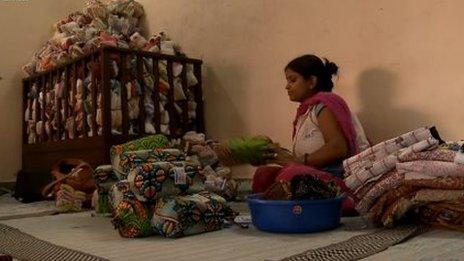
In India women make sanitary towels from recycled cloths
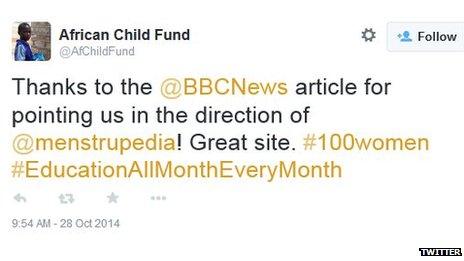
08:25: The BBC's Nuala McGovern is in Nigeria's capital Abuja.
She is speaking to Reuben Abati from the Nigerian government who says he is "optimistic something will come out" of discussions to release the country's 200 kidnapped school girls.
Doreen, a schoolgirl from Nigeria, says she feels "sympathy for them [the girls]. I feel they were really unfortunate to be caught in such a situation."
She and other schoolgirls will be speaking to Nuala all day - and chided for straightening their ties by their school's head mistresses. Girls will be girls...